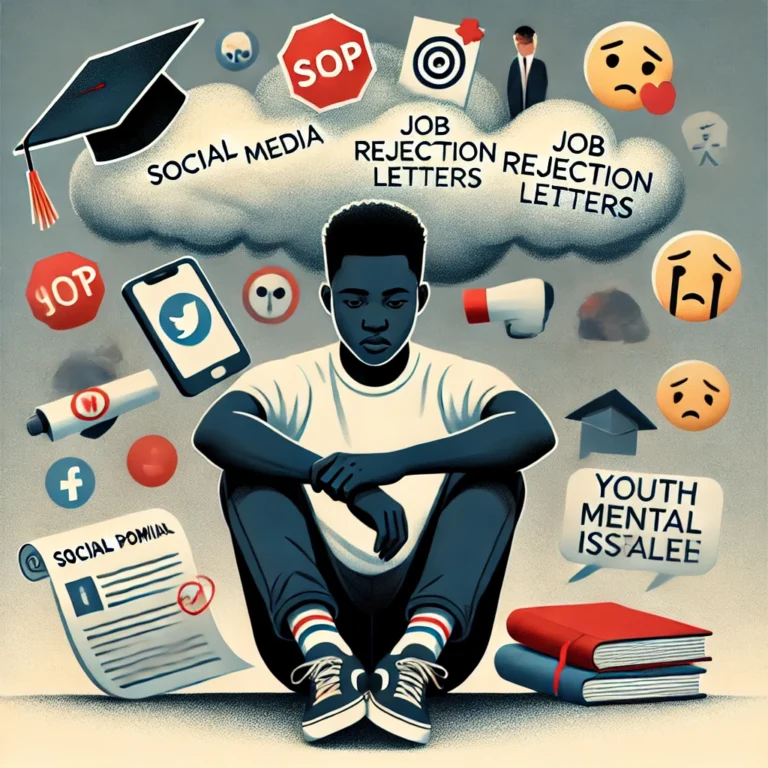Nigeria is home to a youthful population, with more than 60% of its citizens under the age of 25. While this demographic represents immense potential for the country’s future, it is also facing a mental health crisis. Factors such as rising social media use, unemployment, and immense educational pressures are contributing to escalating rates of depression, anxiety, and suicide among Nigeria’s youth.
Understanding the scope of these challenges and addressing them is vital for safeguarding the mental well-being of the next generation.
On October 10, the world observes World Mental Health Day, an effort to remove stigma around mental health concerns and increase public awareness of them.
The Rise in Social Media Use and Mental Health
The surge in social media use among Nigerian youth has brought about both positive and negative consequences. While social media platforms offer connectivity and opportunities for self-expression, they also contribute to mental health challenges. Studies have shown that excessive social media use can lead to feelings of inadequacy, social isolation, and anxiety.
According to a 2023 UNICEF report, over 70% of Nigerian youth aged 15 to 24 spend more than four hours a day on social media platforms such as Instagram, Twitter, and TikTok. Prolonged exposure to idealized portrayals of life, body image comparisons, and cyberbullying has been linked to rising levels of depression and anxiety. A 2022 survey by the Nigerian Youth Mental Health Network revealed that 45% of respondents felt “overwhelmed” by the pressure to meet societal expectations portrayed online.
Moreover, research from WHO Africa shows that Nigeria has one of the highest rates of internet addiction among adolescents in Sub-Saharan Africa, which is closely linked to mental health problems like anxiety and depression. As social media continues to shape the lives of young Nigerians, the need to mitigate its adverse effects on mental health is growing.
Unemployment and Its Impact on Youth Mental Health
Unemployment has long been a significant issue in Nigeria, and it disproportionately affects the country’s youth. The economic hardship resulting from a lack of job opportunities leads to frustration, feelings of hopelessness, and a sense of failure—all of which are detrimental to mental well-being. The National Bureau of Statistics estimates that as of 2023, more than 50% of Nigerians aged 15 to 34 are either unemployed or underemployed.
The psychological toll of unemployment on Nigerian youth cannot be overstated. Many young people face intense pressure from their families and communities to contribute financially, and when they are unable to do so, feelings of inadequacy and depression often follow. The International Labour Organization (ILO) reported in 2022 that Nigerian youth experiencing prolonged unemployment are twice as likely to suffer from anxiety and depression compared to their employed peers. The Mental Health Foundation of Nigeria found that 38% of unemployed young Nigerians reported suicidal thoughts.
Educational Pressures and Mental Health
Educational pressure is another major contributor to mental health challenges among Nigerian youth. The country’s education system is highly competitive, with students often facing overwhelming expectations to excel academically. The stress of exams, particularly the Joint Admissions and Matriculation Board (JAMB) exam, which determines entry into higher education institutions, adds an extra layer of anxiety for many students.
A 2023 survey conducted by Nigerian Students Mental Health Initiative revealed that 63% of secondary and university students reported experiencing anxiety related to their academic performance. Additionally, 29% of respondents indicated that they had contemplated dropping out of school due to stress. The pressure to succeed in a context where education is seen as the primary avenue for socio-economic mobility often leads to high levels of stress and burnout.
In a country where mental health services are limited, young people struggling with academic pressures often do not have access to adequate support. WHO Nigeria reports that the ratio of mental health professionals to the population is alarmingly low, with fewer than 300 psychiatrists serving over 200 million people. The scarcity of counselors and mental health services in schools exacerbates the problem, leaving students with few resources to cope with their mental health challenges.
Suicide Rates and Alarming Trends
Perhaps the most concerning indicator of the youth mental health crisis in Nigeria is the increasing suicide rate. Suicide among young Nigerians is on the rise, and it is often linked to untreated mental health conditions such as depression and anxiety. UNICEF Nigeria reports that suicide is the third leading cause of death among adolescents in the country.
A 2022 study by the Nigerian Suicide Prevention Initiative found that suicide rates among young people aged 15 to 24 have increased by 25% in the last five years. Factors such as academic failure, unemployment, relationship issues, and family expectations are often cited as triggers. However, the stigma surrounding mental illness in Nigeria means that many young people do not seek help, with only 10% of those suffering from depression receiving any form of treatment, according to WHO Nigeria.
Addressing the Crisis
While the mental health challenges facing Nigerian youth are dire, there are steps that can be taken to address the crisis. Mental health awareness campaigns targeting young people are crucial in reducing stigma and encouraging those in need to seek help. In addition, integrating mental health education into school curriculums and providing access to mental health professionals in educational institutions would provide much-needed support to students.
The Nigerian government and private sector must also prioritise youth employment initiatives, as economic stability is key to improving the mental well-being of the country’s youth. Expanding access to mental health services—whether through community-based programs, teletherapy, or mobile mental health apps—could also help bridge the gap between those in need and the support available.
Nigeria’s youth are facing a mental health crisis driven by social media pressures, unemployment, and academic stress. Urgent action is needed to provide this generation with the resources and support necessary to thrive, both mentally and emotionally. Addressing these issues now is critical to ensuring the well-being of Nigeria’s next generation.


